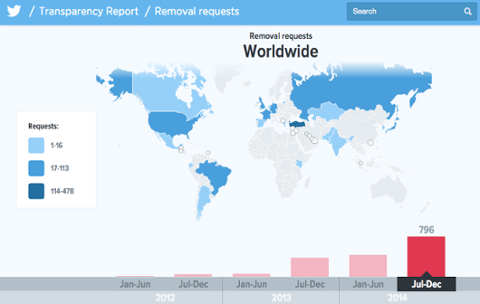 Greetings, citizen.[/caption] When federal contractor Edward Snowden downloaded a trove of National Security Agency (NSA) secrets onto a thumb drive and flew to Hong Kong, intent on exposing what he felt were gross excesses of the U.S. government’s surveillance programs, he probably had little idea what would happen next—but he certainly hoped that people would listen to him. And listen they did. Using Snowden’s documents, The Guardian and The Washington Post published articles in summer 2013 that described two massive NSA projects for monitoring Americans; one of those projects, codenamed PRISM, allegedly siphoned information from the databases of nine major technology companies: Microsoft, Google, Yahoo, Facebook, PalTalk, YouTube, Skype, AOL, and Apple. Most of those firms denied knowledge of the NSA’s work. If that had been the extent of Snowden’s revelations, that might have been the end of it—but Snowden, evidently a busy little bee during his time contracting for the NSA, had much, much more to share with the world. Over the course of the summer, newspapers fueled by Snowden data published story after story on how the NSA, Britain’s GCHQ, and other intelligence agencies had managed to penetrate the world’s telecommunications networks. Faced with a steady drumbeat of protest over the NSA’s activities, the U.S. government finally felt the need to respond. In January (roughly eight months after the first Snowden revelations broke), President Obama took to a podium to detail some major changes in how the NSA collects data—while offering a defense of the agency’s actions. “They’re not abusing authorities to listen to your private phone calls,” he told the audience of reporters and government officials. “What sustains those who work at NSA and these other agencies through all these pressures is the knowledge that their dedication plays a central role in the defense of our nation.” Obama’s proposed reforms, at least in theory, will stop the NSA from storing telephone metadata on its own servers, although the location of the new data repository remains unclear. In addition, the NSA will only pursue phone calls that are two steps removed from a number associated with a terrorist organization, and companies will have the opportunity to reveal more about government requests for their user information. That’s on top of the executive branch supposedly increasing its oversight of intelligence programs via executive order, via annual reviews of targets and missions by senior members of the President’s national security team. Whether or not the federal government curtails its surveillance activities—a lot of people are betting “no”—it’s unlikely that the debate over online privacy and surveillance will end anytime soon. With thousands of Websites planning a mass protest of surveillance on Feb. 11, it’s worth revisiting what you can do to keep yourself as safe as possible online.
Greetings, citizen.[/caption] When federal contractor Edward Snowden downloaded a trove of National Security Agency (NSA) secrets onto a thumb drive and flew to Hong Kong, intent on exposing what he felt were gross excesses of the U.S. government’s surveillance programs, he probably had little idea what would happen next—but he certainly hoped that people would listen to him. And listen they did. Using Snowden’s documents, The Guardian and The Washington Post published articles in summer 2013 that described two massive NSA projects for monitoring Americans; one of those projects, codenamed PRISM, allegedly siphoned information from the databases of nine major technology companies: Microsoft, Google, Yahoo, Facebook, PalTalk, YouTube, Skype, AOL, and Apple. Most of those firms denied knowledge of the NSA’s work. If that had been the extent of Snowden’s revelations, that might have been the end of it—but Snowden, evidently a busy little bee during his time contracting for the NSA, had much, much more to share with the world. Over the course of the summer, newspapers fueled by Snowden data published story after story on how the NSA, Britain’s GCHQ, and other intelligence agencies had managed to penetrate the world’s telecommunications networks. Faced with a steady drumbeat of protest over the NSA’s activities, the U.S. government finally felt the need to respond. In January (roughly eight months after the first Snowden revelations broke), President Obama took to a podium to detail some major changes in how the NSA collects data—while offering a defense of the agency’s actions. “They’re not abusing authorities to listen to your private phone calls,” he told the audience of reporters and government officials. “What sustains those who work at NSA and these other agencies through all these pressures is the knowledge that their dedication plays a central role in the defense of our nation.” Obama’s proposed reforms, at least in theory, will stop the NSA from storing telephone metadata on its own servers, although the location of the new data repository remains unclear. In addition, the NSA will only pursue phone calls that are two steps removed from a number associated with a terrorist organization, and companies will have the opportunity to reveal more about government requests for their user information. That’s on top of the executive branch supposedly increasing its oversight of intelligence programs via executive order, via annual reviews of targets and missions by senior members of the President’s national security team. Whether or not the federal government curtails its surveillance activities—a lot of people are betting “no”—it’s unlikely that the debate over online privacy and surveillance will end anytime soon. With thousands of Websites planning a mass protest of surveillance on Feb. 11, it’s worth revisiting what you can do to keep yourself as safe as possible online.
'The Day We Fight Back': How to Lock Down Your Data Online
[caption id="attachment_17173" align="aligncenter" width="500"]  Greetings, citizen.[/caption] When federal contractor Edward Snowden downloaded a trove of National Security Agency (NSA) secrets onto a thumb drive and flew to Hong Kong, intent on exposing what he felt were gross excesses of the U.S. government’s surveillance programs, he probably had little idea what would happen next—but he certainly hoped that people would listen to him. And listen they did. Using Snowden’s documents, The Guardian and The Washington Post published articles in summer 2013 that described two massive NSA projects for monitoring Americans; one of those projects, codenamed PRISM, allegedly siphoned information from the databases of nine major technology companies: Microsoft, Google, Yahoo, Facebook, PalTalk, YouTube, Skype, AOL, and Apple. Most of those firms denied knowledge of the NSA’s work. If that had been the extent of Snowden’s revelations, that might have been the end of it—but Snowden, evidently a busy little bee during his time contracting for the NSA, had much, much more to share with the world. Over the course of the summer, newspapers fueled by Snowden data published story after story on how the NSA, Britain’s GCHQ, and other intelligence agencies had managed to penetrate the world’s telecommunications networks. Faced with a steady drumbeat of protest over the NSA’s activities, the U.S. government finally felt the need to respond. In January (roughly eight months after the first Snowden revelations broke), President Obama took to a podium to detail some major changes in how the NSA collects data—while offering a defense of the agency’s actions. “They’re not abusing authorities to listen to your private phone calls,” he told the audience of reporters and government officials. “What sustains those who work at NSA and these other agencies through all these pressures is the knowledge that their dedication plays a central role in the defense of our nation.” Obama’s proposed reforms, at least in theory, will stop the NSA from storing telephone metadata on its own servers, although the location of the new data repository remains unclear. In addition, the NSA will only pursue phone calls that are two steps removed from a number associated with a terrorist organization, and companies will have the opportunity to reveal more about government requests for their user information. That’s on top of the executive branch supposedly increasing its oversight of intelligence programs via executive order, via annual reviews of targets and missions by senior members of the President’s national security team. Whether or not the federal government curtails its surveillance activities—a lot of people are betting “no”—it’s unlikely that the debate over online privacy and surveillance will end anytime soon. With thousands of Websites planning a mass protest of surveillance on Feb. 11, it’s worth revisiting what you can do to keep yourself as safe as possible online.
Greetings, citizen.[/caption] When federal contractor Edward Snowden downloaded a trove of National Security Agency (NSA) secrets onto a thumb drive and flew to Hong Kong, intent on exposing what he felt were gross excesses of the U.S. government’s surveillance programs, he probably had little idea what would happen next—but he certainly hoped that people would listen to him. And listen they did. Using Snowden’s documents, The Guardian and The Washington Post published articles in summer 2013 that described two massive NSA projects for monitoring Americans; one of those projects, codenamed PRISM, allegedly siphoned information from the databases of nine major technology companies: Microsoft, Google, Yahoo, Facebook, PalTalk, YouTube, Skype, AOL, and Apple. Most of those firms denied knowledge of the NSA’s work. If that had been the extent of Snowden’s revelations, that might have been the end of it—but Snowden, evidently a busy little bee during his time contracting for the NSA, had much, much more to share with the world. Over the course of the summer, newspapers fueled by Snowden data published story after story on how the NSA, Britain’s GCHQ, and other intelligence agencies had managed to penetrate the world’s telecommunications networks. Faced with a steady drumbeat of protest over the NSA’s activities, the U.S. government finally felt the need to respond. In January (roughly eight months after the first Snowden revelations broke), President Obama took to a podium to detail some major changes in how the NSA collects data—while offering a defense of the agency’s actions. “They’re not abusing authorities to listen to your private phone calls,” he told the audience of reporters and government officials. “What sustains those who work at NSA and these other agencies through all these pressures is the knowledge that their dedication plays a central role in the defense of our nation.” Obama’s proposed reforms, at least in theory, will stop the NSA from storing telephone metadata on its own servers, although the location of the new data repository remains unclear. In addition, the NSA will only pursue phone calls that are two steps removed from a number associated with a terrorist organization, and companies will have the opportunity to reveal more about government requests for their user information. That’s on top of the executive branch supposedly increasing its oversight of intelligence programs via executive order, via annual reviews of targets and missions by senior members of the President’s national security team. Whether or not the federal government curtails its surveillance activities—a lot of people are betting “no”—it’s unlikely that the debate over online privacy and surveillance will end anytime soon. With thousands of Websites planning a mass protest of surveillance on Feb. 11, it’s worth revisiting what you can do to keep yourself as safe as possible online.
 Greetings, citizen.[/caption] When federal contractor Edward Snowden downloaded a trove of National Security Agency (NSA) secrets onto a thumb drive and flew to Hong Kong, intent on exposing what he felt were gross excesses of the U.S. government’s surveillance programs, he probably had little idea what would happen next—but he certainly hoped that people would listen to him. And listen they did. Using Snowden’s documents, The Guardian and The Washington Post published articles in summer 2013 that described two massive NSA projects for monitoring Americans; one of those projects, codenamed PRISM, allegedly siphoned information from the databases of nine major technology companies: Microsoft, Google, Yahoo, Facebook, PalTalk, YouTube, Skype, AOL, and Apple. Most of those firms denied knowledge of the NSA’s work. If that had been the extent of Snowden’s revelations, that might have been the end of it—but Snowden, evidently a busy little bee during his time contracting for the NSA, had much, much more to share with the world. Over the course of the summer, newspapers fueled by Snowden data published story after story on how the NSA, Britain’s GCHQ, and other intelligence agencies had managed to penetrate the world’s telecommunications networks. Faced with a steady drumbeat of protest over the NSA’s activities, the U.S. government finally felt the need to respond. In January (roughly eight months after the first Snowden revelations broke), President Obama took to a podium to detail some major changes in how the NSA collects data—while offering a defense of the agency’s actions. “They’re not abusing authorities to listen to your private phone calls,” he told the audience of reporters and government officials. “What sustains those who work at NSA and these other agencies through all these pressures is the knowledge that their dedication plays a central role in the defense of our nation.” Obama’s proposed reforms, at least in theory, will stop the NSA from storing telephone metadata on its own servers, although the location of the new data repository remains unclear. In addition, the NSA will only pursue phone calls that are two steps removed from a number associated with a terrorist organization, and companies will have the opportunity to reveal more about government requests for their user information. That’s on top of the executive branch supposedly increasing its oversight of intelligence programs via executive order, via annual reviews of targets and missions by senior members of the President’s national security team. Whether or not the federal government curtails its surveillance activities—a lot of people are betting “no”—it’s unlikely that the debate over online privacy and surveillance will end anytime soon. With thousands of Websites planning a mass protest of surveillance on Feb. 11, it’s worth revisiting what you can do to keep yourself as safe as possible online.
Greetings, citizen.[/caption] When federal contractor Edward Snowden downloaded a trove of National Security Agency (NSA) secrets onto a thumb drive and flew to Hong Kong, intent on exposing what he felt were gross excesses of the U.S. government’s surveillance programs, he probably had little idea what would happen next—but he certainly hoped that people would listen to him. And listen they did. Using Snowden’s documents, The Guardian and The Washington Post published articles in summer 2013 that described two massive NSA projects for monitoring Americans; one of those projects, codenamed PRISM, allegedly siphoned information from the databases of nine major technology companies: Microsoft, Google, Yahoo, Facebook, PalTalk, YouTube, Skype, AOL, and Apple. Most of those firms denied knowledge of the NSA’s work. If that had been the extent of Snowden’s revelations, that might have been the end of it—but Snowden, evidently a busy little bee during his time contracting for the NSA, had much, much more to share with the world. Over the course of the summer, newspapers fueled by Snowden data published story after story on how the NSA, Britain’s GCHQ, and other intelligence agencies had managed to penetrate the world’s telecommunications networks. Faced with a steady drumbeat of protest over the NSA’s activities, the U.S. government finally felt the need to respond. In January (roughly eight months after the first Snowden revelations broke), President Obama took to a podium to detail some major changes in how the NSA collects data—while offering a defense of the agency’s actions. “They’re not abusing authorities to listen to your private phone calls,” he told the audience of reporters and government officials. “What sustains those who work at NSA and these other agencies through all these pressures is the knowledge that their dedication plays a central role in the defense of our nation.” Obama’s proposed reforms, at least in theory, will stop the NSA from storing telephone metadata on its own servers, although the location of the new data repository remains unclear. In addition, the NSA will only pursue phone calls that are two steps removed from a number associated with a terrorist organization, and companies will have the opportunity to reveal more about government requests for their user information. That’s on top of the executive branch supposedly increasing its oversight of intelligence programs via executive order, via annual reviews of targets and missions by senior members of the President’s national security team. Whether or not the federal government curtails its surveillance activities—a lot of people are betting “no”—it’s unlikely that the debate over online privacy and surveillance will end anytime soon. With thousands of Websites planning a mass protest of surveillance on Feb. 11, it’s worth revisiting what you can do to keep yourself as safe as possible online.

